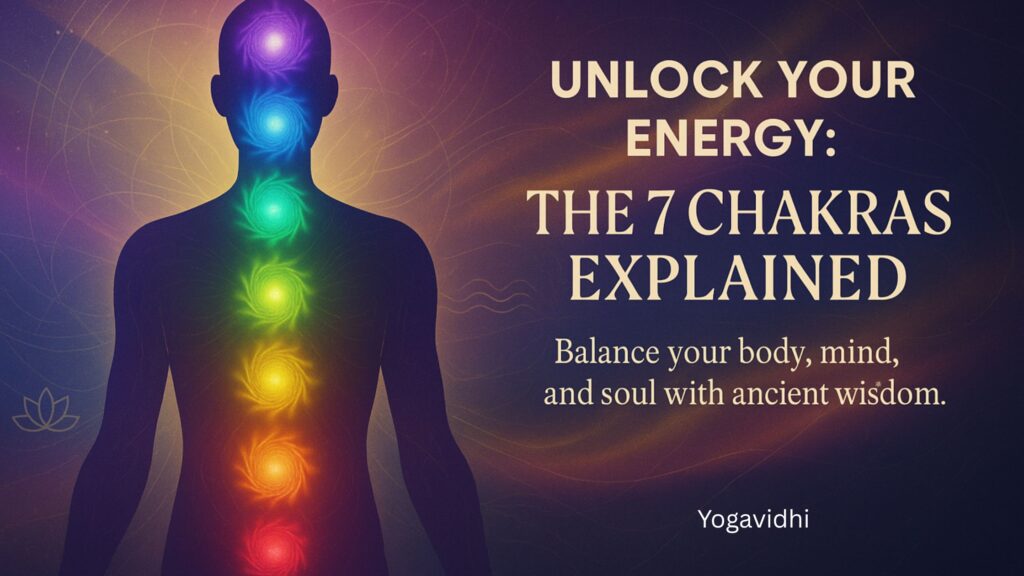Have you ever felt emotionally stuck, spiritually disconnected, or physically drained for no clear reason? The answer might lie in your energy centers, known as the 7 chakras in the human body. Rooted in ancient Indian traditions, chakras are not just spiritual ideas—they are powerful tools to balance your body, mind, and soul.
In this in-depth guide, you’ll discover everything you need to know about the 7 chakras in the human body, how they affect your health and well-being, and the best practices to activate and align them for a vibrant life.
The seven chakras in the human body are considered energy centers that impact physical, emotional, and spiritual health. These include the Root Chakra (Muladhara), Sacral Chakra (Swadhisthana), Solar Plexus Chakra (Manipura), Heart Chakra (Anahata), Throat Chakra (Vishuddha), Third Eye Chakra (Ajna), and Crown Chakra (Sahasrara).
Table of Contents
What Are Chakras?
The word “chakra” comes from Sanskrit, meaning “wheel” or “disk.” These spinning wheels of energy are located along your spine, starting from the base and moving up to the crown of your head. Each chakra corresponds to different physical, emotional, and spiritual aspects of your being.
There are 7 major chakras in the human body, and when they are open and balanced, energy flows freely, bringing harmony and vitality. However, blockages in any of these chakras can lead to emotional unrest, physical illness, or mental fatigue.
Why Are the 7 Chakras Important?
Understanding the 7 chakras is like having a roadmap to self-awareness and healing. These energy points are connected to major organs and nerve centers and directly influence your mood, behavior, and physical health.
When all 7 chakras in the human body are in alignment:
- You feel more grounded and secure.
- Emotions flow naturally without getting stuck.
- Creativity and confidence soar.
- Communication becomes clearer.
- Intuition sharpens.
- A deeper sense of spiritual connection emerges.
Let’s explore each chakra in detail and how it plays a role in your everyday life.
The 7 Chakras in Human Body: A Complete Breakdown
1. Root Chakra (Muladhara)
- Location: Base of the spine
- Color: Red
- Element: Earth
- Associated With: Survival, security, grounding
The Root Chakra forms the foundation of the chakra system. It governs your sense of safety and stability—both physically and emotionally. When this chakra is blocked, you may feel anxious, fearful, or financially insecure.
Balance It With:
- Grounding yoga poses like Mountain Pose or Warrior I
- Walking barefoot on natural ground
- Eating root vegetables like carrots and beets
2. Sacral Chakra (Svadhisthana)
- Location: Lower abdomen, below the navel
- Color: Orange
- Element: Water
- Associated With: Creativity, sexuality, pleasure
The Sacral Chakra is your center of joy, desire, and creativity. A balanced sacral chakra allows you to enjoy life, express yourself artistically, and form healthy emotional and sexual relationships.
Balance It With:
- Hip-opening yoga poses
- Dancing, swimming, or creative activities
- Hydration and consuming water-rich fruits
3. Solar Plexus Chakra (Manipura)
- Location: Upper abdomen (stomach area)
- Color: Yellow
- Element: Fire
- Associated With: Confidence, personal power, will
The Solar Plexus Chakra controls your self-esteem and motivation. When this chakra is balanced, you feel empowered and self-assured. Imbalances can manifest as low self-worth or control issues.
Balance It With:
- Core-strengthening yoga
- Positive affirmations
- Sun exposure and yellow foods like bananas and corn
4. Heart Chakra (Anahata)
- Location: Center of the chest
- Color: Green
- Element: Air
- Associated With: Love, compassion, forgiveness
This chakra is the bridge between the lower and upper chakras. It governs your ability to give and receive love, feel compassion, and heal from emotional wounds. Blockages often lead to loneliness, bitterness, or trust issues.
Balance It With:
- Backbends like Camel or Cobra Pose
- Gratitude journaling
- Acts of kindness and forgiveness
5. Throat Chakra (Vishuddha)
- Location: Throat
- Color: Blue
- Element: Ether
- Associated With: Communication, truth, self-expression
Your Throat Chakra enables you to speak your truth with confidence. When open, you feel comfortable expressing your thoughts and emotions. When blocked, you may feel unheard or misunderstood.
Balance It With:
- Singing or chanting
- Neck stretches and fish pose
- Speaking affirmations out loud
6. Third Eye Chakra (Ajna)
- Location: Between the eyebrows
- Color: Indigo
- Element: Light
- Associated With: Intuition, insight, imagination
The Third Eye Chakra is your inner guide. It helps you see beyond illusions and trust your instincts. A blocked third eye can result in confusion, lack of clarity, or denial of your inner truth.
Balance It With:
- Meditation and mindfulness
- Journaling your dreams and thoughts
- Visualization practices
7. Crown Chakra (Sahasrara)
- Location: Top of the head
- Color: Violet or white
- Element: Cosmic energy
- Associated With: Spirituality, enlightenment, connection to the universe
The Crown Chakra connects you to your higher self and universal consciousness. It represents the pinnacle of your spiritual journey. When balanced, it brings peace, wisdom, and a sense of purpose.
Balance It With:
- Silence and stillness
- Prayer or spiritual study
- Meditation on oneness and gratitude
Read More: Yoga Therapy: A Holistic Path to Healing and Well-Being
Read More: Yoga for Beginners: Your Ultimate Guide to Start a Life-Changing Journey
| Chakra Name | Location | Color | Element | Associated Qualities | Signs of Imbalance | Balancing Techniques |
| Root Chakra (Muladhara) | Base of the spine | Red | Earth | Stability, security, grounding | Anxiety, fear, financial insecurity | Grounding yoga, walking barefoot, root veggies |
| Sacral Chakra (Svadhisthana) | Lower abdomen (below navel) | Orange | Water | Creativity, sexuality, pleasure | Guilt, lack of passion, intimacy issues | Hip-openers, dance, hydration |
| Solar Plexus Chakra (Manipura) | Upper abdomen (stomach) | Yellow | Fire | Confidence, willpower, self-esteem | Low confidence, indecision, anger | Core yoga, sun exposure, affirmations |
| Heart Chakra (Anahata) | Center of the chest | Green | Air | Love, compassion, forgiveness | Loneliness, grief, bitterness | Backbends, gratitude, heart-opening acts |
| Throat Chakra (Vishuddha) | Throat | Blue | Ether (Space) | Communication, truth, expression | Sore throat, fear of speaking, dishonesty | Singing, chanting, neck stretches |
| Third Eye Chakra (Ajna) | Forehead (between eyebrows) | Indigo | Light | Intuition, insight, inner wisdom | Confusion, poor decisions, lack of focus | Meditation, visualization, journaling |
| Crown Chakra (Sahasrara) | Top of the head | Violet/White | Cosmic Energy | Spirituality, connection to higher self | Disconnection, depression, lack of purpose | Silence, spiritual study, gratitude meditation |
How the 7 Chakras in Human Body Affect Your Health
The chakras are not only symbolic but also deeply connected to your nervous and endocrine systems. When a chakra is out of balance, it can show up as both emotional distress and physical symptoms.
Examples:
- Root chakra imbalance: Chronic fatigue, lower back pain, anxiety
- Heart chakra blockage: Heart issues, asthma, emotional numbness
- Throat chakra block: Sore throat, thyroid problems, communication issues
Balancing these energy centers helps create harmony in your entire being—from cellular function to emotional resilience.
How to Activate and Balance the 7 Chakras in Human Body
There are multiple techniques to align and heal your chakras. Choose what resonates with you:
1. Yoga Poses for Each Chakra
Yoga is one of the most powerful tools to activate the 7 chakras in the human body. Different asanas stimulate specific energy centers.
2. Breathwork (Pranayama)
Breath control clears energetic blockages and enhances prana (life force). Try Nadi Shodhana or Bhramari for deep healing.
3. Meditation and Visualization
Sit in silence, focus on the chakra area, and visualize the chakra’s color spinning like a vibrant wheel.
4. Sound Healing and Mantras
Chanting bija (seed) mantras like “Lam” for Root or “Om” for Crown aligns your vibration with that of the universe.
5. Crystals and Aromatherapy
Use stones like amethyst for the crown or rose quartz for the heart chakra. Essential oils like lavender or sandalwood also support chakra healing.
Signs Your Chakras Are Balanced
When your chakras are aligned:
- You feel energized, clear, and joyful.
- Emotions flow without overwhelming you.
- You attract positive experiences and relationships.
- You become more intuitive and spiritually awakened.
The ultimate goal of working with the 7 chakras in the human body is to achieve holistic balance—physically, emotionally, and spiritually.
Common Myths About Chakras
- Myth: Chakras are religious.
Truth: They are spiritual but not bound to any religion. - Myth: You must be a yoga expert to balance chakras.
Truth: Anyone can work with their chakras using simple practices. - Myth: Chakra healing happens overnight.
Truth: Like physical fitness, energy alignment takes consistent effort.
Make Chakra Healing a Daily Practice
Start small:
- Meditate for 10 minutes focusing on one chakra each day.
- Practice yoga that targets specific chakras.
- Keep a chakra journal to track your emotional and energetic shifts.
Even 10–15 minutes a day can bring noticeable transformation over time.

Conclusion: Embrace the Power of the 7 Chakras in Human Body
The 7 chakras in the human body are more than just metaphysical concepts—they are essential keys to self-healing, inner peace, and conscious living. When you align these powerful energy centers, you unlock your full potential and step into a more vibrant, awakened life.
Start today. Tune into your energy, honor your body, and reconnect with your higher self. Because true healing doesn’t come from the outside—it starts from within.
FAQs About the 7 Chakras in Human Body:
Q. What are the 7 chakras in the human body?
Ans: The 7 chakras are energy centers located along the spine, starting from the base to the crown of the head. Each chakra governs specific physical, emotional, and spiritual aspects of our well-being. The chakras are: Root, Sacral, Solar Plexus, Heart, Throat, Third Eye, and Crown.
Q. How do I know if one of my chakras is blocked?
Ans: Signs of blocked chakras can include emotional imbalances (like anxiety, anger, or sadness), physical symptoms (like fatigue, pain, or illness), or behavioral patterns (such as fear of communication or lack of confidence). Regular self-awareness, meditation, or chakra assessments can help identify blockages.
Q. Can yoga really help balance the 7 chakras in the human body?
Ans: Yes, specific yoga poses (asanas) target each chakra and help stimulate energy flow. For example, grounding poses like Mountain or Warrior I support the Root Chakra, while heart-opening poses like Camel pose activate the Heart Chakra.
Q. How long does it take to align all 7 chakras?
Ans: There is no fixed timeline. Chakra alignment is a personal journey that varies for each individual. With consistent practices like meditation, yoga, breathwork, and mindfulness, many people begin noticing shifts in their energy and emotions within a few weeks.
Q. Do I need to follow a spiritual path to work with my chakras?
Ans: Not at all. While chakras are rooted in ancient spiritual traditions, you don’t need to follow a particular religion or belief system to benefit from chakra work. It’s a holistic practice open to anyone interested in personal growth and energy healing.
Q. What do the 7 chakras mean?
Ans: The seven chakras are energy centers within the body, each linked to specific aspects of physical, emotional, and spiritual well-being. They are thought to affect our health, emotions, and spiritual growth.
Q. What is the use of 7 chakras in the human body?
Ans: They are regarded as centers of vital spiritual energy, or prana, which is believed to circulate between them through channels known as nadis. The chakras function by spinning and attracting this energy to help maintain balance in the body’s spiritual, mental, emotional, and physical well-being.
Q. What is the concept of chakras?
Ans: Chakras are believed to supply subtle energy that supports the optimal functioning of your organs, mind, and intellect. While medical research has yet to extensively explore chakras and spiritual energy, they can offer a meaningful way to reflect on your mind and body—much like other religious or spiritual beliefs.
Q. How do I open my 7 chakras?
Ans: Begin by identifying the specific chakra you want to activate.
Practice daily meditation focused on that chakra to channel its energy and restore balance.
Chanting specific mantras can also help awaken dormant chakras.
For deeper guidance, consider joining guided meditation classes or chakra healing sessions with professionals.
Declaration Note:
We use third-party videos and images on https://yogavidhi.com/ for educational and illustrative purposes. All rights belong to their respective owners. No copyright infringement is intended.



